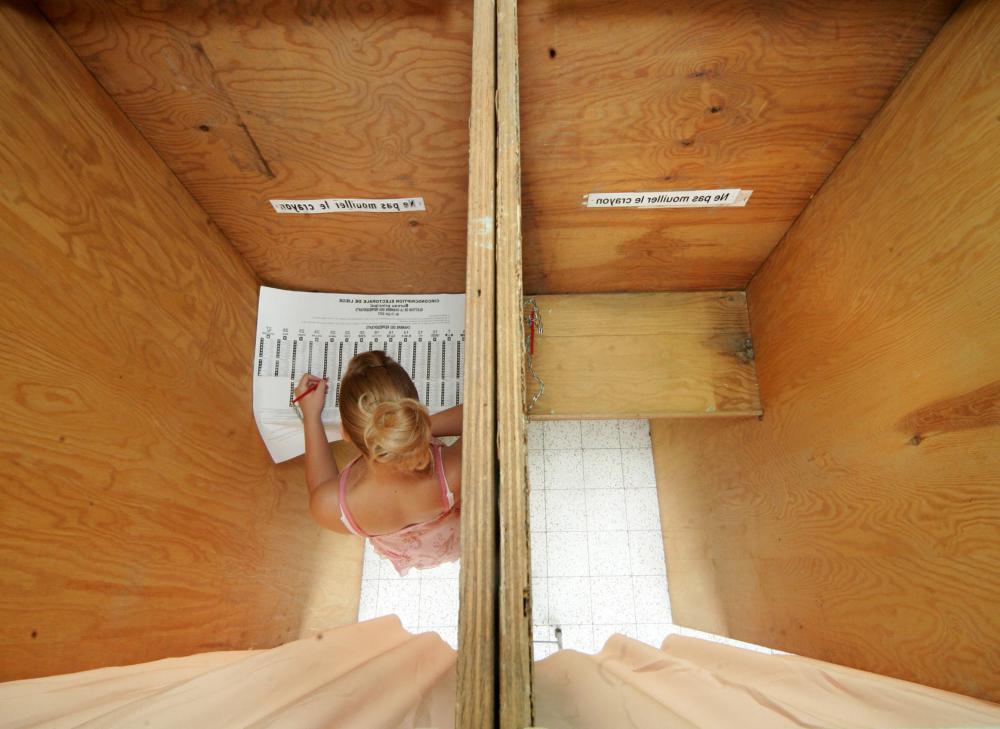At WiseGEEK, we're committed to delivering accurate, trustworthy information. Our expert-authored content is rigorously fact-checked and sourced from credible authorities. Discover how we uphold the highest standards in providing you with reliable knowledge.
What is a Faithless Elector?
A faithless elector is a member of an electoral college who refuses to cast a vote for his or her pledged candidate. This term is used most commonly in American politics, although technically members of electoral colleges all over the world could be faithless, if they so desired. These individuals are often subject to political reprisal for their actions, in cases where they can be identified. In other areas, the ballots of the electors are secret, so it's possible to develop a list of suspects, but the identity of the person cannot be confirmed.
An electoral college is a group of individuals known as electors who are convened to elect a public official. Typically, the electors are given a mandate by the voters, with individuals being “pledged” to vote for specific candidates or parties. Unpledged electors may vote for whomever they like. In the case of pledged electors, if the person votes for someone other than his or her candidate, he or she becomes a faithless elector.

In the history of the American electoral college as of 2008, 156 faithless electors had been recorded. Of these, 71 were forced to become faithless because their pledged candidates died between the general election and the convening of the electoral college. The others deliberately chose to cast votes for other candidates for a variety of reasons, although a few appear to have been faithless by accident, as in 2004 when an elector in Minnesota accidentally wrote “John Edwards” on both the presidential and vice presidential ballots.

Several faithless electors have made a conscious decision to vote for the opposition candidate because they felt that the candidate was better suited to the job. In other instances, an elector may defect as a political statement. Some from Washington, DC, for example, have chosen to cast blank ballots to protest the region's lack of statehood and representation in the federal government. Others have also defied their pledges to protest what they perceive as stolen or questionable elections.

In some regions, there are specific laws that provide penalties for someone who chooses to vote for someone other than the candidate for whom he or she is pledged. Others may be subject to party censure and public disapproval, but face no legal penalties. Because of the risk of defection, electors are usually chosen very carefully. High-ranking and especially loyal members of political parties are the best candidates for these positions, since they are the least likely to violate their pledge.
AS FEATURED ON:
AS FEATURED ON:














Discussion Comments
@nony - I understand what you’re saying, but the electoral college is meant to protect the small states.
Why should larger states swing elections on their own? In that case, elections could be determined by just a handful of coastal states with the largest populations.
I don’t think that seems fair. The electoral college is a way of ensuring that each state is represented in the final vote count, and that each state – even the smallest one – can make a difference in the final outcome.
@everetra - I don’t think there is such a case, but I agree that the debate of the electoral college vs the popular vote is one that we should be having.
I am not a fan of the electoral college because I believe that if you want to be President of the United States, you should convince the greatest number of people.
Some people protest that this would be “majority rule.” But ask yourself this question – what determines who wins the electors for the state?
It’s simple; it’s the majority of votes for that state. It’s winner take all, even if only fifty one percent of the population in the state voted for one candidate.
So I argue that even with the electoral college, you have majority rule in a sense. I think it would just be easier to be done with the electoral college and the mad scrambling for picking up individual states each election cycle, and go with simple majority.
I wonder if there is a recorded case of a faithless elector – or electors – swinging the outcome of an election? I can’t think of any in recorded memory but I think that would give you the idea of the power of the elector.
People often talk about the electoral college pros, citing the representative nature of the electoral college as one example.
However, I think the faithless elector is one example of the weakness of the electoral college; in that sense, it could be subject to corruption and fraud in the same way that an election won by strictly a popular vote could be.
Post your comments